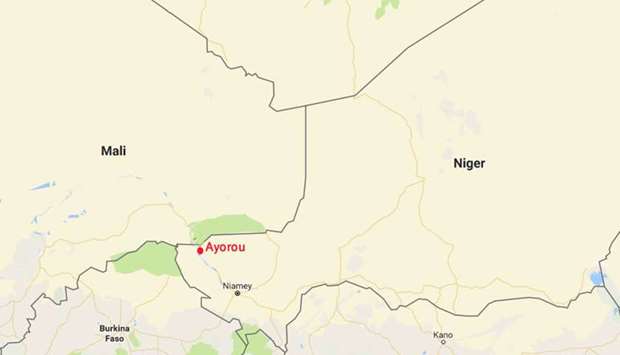The village is a few dozen kilometres from where militants killed four US soldiers in an ambush on Oct. 4 that has thrown a spotlight on US counterterrorism mission in Niger, which straddles a large expanse of the Sahara.
Niger's military officials confirmed the attack and death toll but gave no further details.
The assailants crossed over the border from Mali and drove up to the village of Ayorou, about 40 km inside, before springing their attack, the security sources said.
"They were heavily armed. They had rocket launchers and machine guns. They came in four vehicles each with about seven fighters," said a security source on the scene.
Reinforcements later arrived and stopped them as they tried to head back into Mali, another security source on the scene said, and a gun battle with the militants was underway.
"Land and air forces are pursuing the assailants with a view to neutralising them," a statement from Niger's military said, confirming the death toll.
In the initial attack one of the assailants was killed in an exchange of fire but others managed to make off with four Nigerien army vehicles, the first security source said.
Since taking over swathes of northern Mali in 2012, and then being scattered by a French-led counter-offensive the following year, Islamist militants have established themselves in several lawless spaces across the desert.
They have used these areas as a springboard for a wave of attacks that threaten to destabilise much of West Africa. Fighters have inflicted damage on military outposts, killed security officials and civilians, kidnapped Westerners and sometimes mounted high-profile attacks on hotels and resorts across the region, including in Burkina Faso and Ivory Coast.
Several Islamist militant groups and well-armed ethnic militia are known to operate in the area along the Mali-Niger border, and there have been at least 46 attacks recorded there since early last year.
However, officials suspect many of them, including the ambush on the joint US-Niger patrol, to be the work of a group called Islamic State in the Greater Sahara, led by Arabic-speaking north African militant Adnan Walid al-Sahrawi. He has pledged allegiance to Islamic State militants in Iraq and Syria, although the extent of their ties are not well known.
No group has yet claimed responsibility for Saturday's attack, or the one that killed the US soldiers.
Responding to its ever growing militant threat, Mali on Saturday announced a year-long extension of a state of emergency across the country.
"I hope we won't need to continue extending the state of emergency," Defence Minister Tiena Coulibaly told reporters. "We hope that before 31st October, 2018, order will be restored."
The increasingly fluid, cross-border nature of the militant threat has forced the Sahel countries to work closer together. In July Mali, Niger, Chad, Mauritania and Burkina Faso launched a joint force -- nicknamed "G5 Sahel" -- to try better coordinate policing their deserts.
But it has yet to receive a commitment to more than a fraction of the donor funding that it needs to operate.

The assailants crossed over the border from Mali and drove up to the village of Ayorou
Gunmen on pick-up trucks and motorcycles coming from Mali killed 13 gendarmes and wounded five more in an attack on their base in western Niger, security sources said on Saturday.
